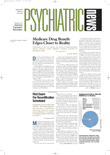"I have always been fascinated by psychiatry," said physician assistant Peggy Jacklich. "In PA school you learn about physical health, and there is such a strong connection between physical health and mental health."
Jacklich first earned a master's degree in public health with a concentration in mental health and medical anthropology. She then completed her PA training at Pacific University in Forest Grove, Ore. In April she finished a unique "residency" training program in psychiatry for PAs at the Cherokee Mental Health Institute in Cherokee, Iowa, and began working at Statesboro Psychiatric Associates in Statesboro, Ga.
Most PAs working in psychiatry do not go through such specialized training as Jacklich received at Cherokee, but learn the specialty "on the job" after finishing their basic PA training.
According to the American Association of Physician Assistants (AAPA), PAs are educated in a medical model designed to complement physician training and are taught to diagnose and treat medical problems. Education consists of classroom and laboratory instruction in the basic medical and behavioral sciences (such as anatomy, pharmacology, pathophysiology, clinical medicine, and physical diagnosis), followed by clinical rotations in internal medicine, family medicine, surgery, pediatrics, obstetrics and gynecology, emergency medicine, and geriatric medicine.
The Accreditation Review Commission on Education of Physician Assistants Inc., the accrediting agency for PA training programs, said that training in behavioral and social sciences must include instruction in personality development, child development, normative responses to stress, psychosomatic manifestations of illness and injury, sexuality, and responses to death and dying.
Programs must also provide instruction in "basic counseling skills necessary to help patients and families cope with illness and injury, follow prescribed treatment regimens, and modify their behaviors to more healthful patterns," according to the accrediting agency.
AAPA says that the typical PA program is 24 to 25 months long and requires at least two years of college and some health care experience prior to admission. The majority of students have a BA/BS degree and 45 months of health care experience before admission to a PA program. PAs receive their national certification from the National Commission on Certification of Physician Assistants (NCCPA).
Licensing laws vary from state to state in how scope of practice is defined. In California, the scope of a PA's practice is defined as follows: "Medical services delegated in writing, within supervising physician's customary practice and within PA's competence. PA may take histories; perform physical examinations; perform or assist with laboratory, screening, and therapeutic procedures; counsel patients; and assist physician in institutional settings."
In Florida, it is defined this way: "PA may perform delegated tasks and procedures for which he or she is skilled that are within supervising physician's scope of practice. Some duties may only be performed if the physician is on the premises, such as insertion of chest tubes and monitoring cardiac stress tests. Final diagnoses may not be delegated."
Forty-seven states, the District of Columbia, and Guam have enacted laws that authorize PA prescribing. Indiana, Louisiana, and Ohio have not authorized prescribing by PAs, according to AAPA.
